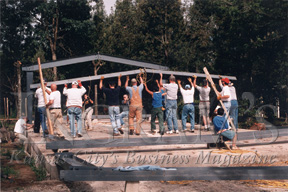by chris becicka
Building Hope

"Strickland employees and other volunteers
raise beams for a building in El Centro, Guatamala.
"This does so much for everyone." Cindy Gray, project manager
for Strickland Construction Company, is talking about her trip last November
to Guatemala where she helped build a shelter for battered women. "As
an individual, it made me appreciate so much more what I have at home.
Working there is both heart wrenching and heart warming."
She and 19 of her colleagues have gone to either Guatemala or Brazil to
help build churches, dorms, community centers, schools or doctor offices.
They go because their president and CEO, Rogers Strickland, believes that
working together for others "brings us the message of what’s
important about life and work." Strickland believes so strongly in
his own message that he goes himself and works with his employees, pays
them their regular salary, pays for their trip plus a family member, and
together they construct the Butler buildings that change poor people’s
lives. He also has extended this policy to folks who can’t leave
town for a week—he’ll give them that week’s pay if they
want to participate in community service work here at home.
You gain such a different viewpoint, he says. "We have so much extra
time and extra money—we’re burdened with our wealth, with our
stuff. It’s somehow freeing to have so little and to live so simply
for a short time. You are forced to sit back and talk with people—it
reminds me of sitting on the front porch in Armstrong, Mo., summer nights.
It harkens back to what’s fundamentally important—the people."
This year they’re putting up six buildings. Strickland is going to
build a church next to a city dump in Recife, Brazil. Why there? Like
our old Homestead Act, if you find vacant land there, "squat"
on it for five years, it’s yours. The only place the poorest could
find a place to live was the undesirable dump land—where they also
make their livings picking through the garbage. They need a church, so
one will be built there.
Strickland’s company has done well. After two years in the ministry
and seven in the Air Force, he followed his father’s footsteps and
became a contractor in 1980, building farm buildings and grain storage.
Now he and his 55 employees build churches, self-storage, and office-warehousing
primarily. He says he is able to "finally bring all the different
parts of my life and interests together—I’m a contractor who
ministers."
Both his company and his project work have expanded greatly the last few
years. He began the foreign buildings on the request of his minister to
provide a work project for the church youth. Now he gets more requests
than he can fill.
He and his company have spent almost $600,000 on all these projects the
last five years. Now they’re asking people to come along. They’ve
formed a 501(c)(3) foundation called Side by Side. "We’re working
side by side with the poorest of the poor, building necessary buildings
so they can take pride of ownership in their accomplishment."
Both he and employee Cindy Gray think that helping others through such
projects brings the work force closer together. Strickland says the trips
have engendered "as much of a sense of family as you can have, I
think. That’s been a vision of mine. As many hours as you work, you’d
better like what you do and who you work with." Cindy Gray says,
"We all work together as a group and in friendship. Not only does
it help us give back to the community, as Rogers says a million times,
there are less fortunate people who benefit from our help, but it makes
us feel good. And those who stay home are helping, too—we couldn’t
leave if they weren’t willing to do our work for a week."
"I wish it would catch on and other companies would see the results,
too," she concludes wistfully.